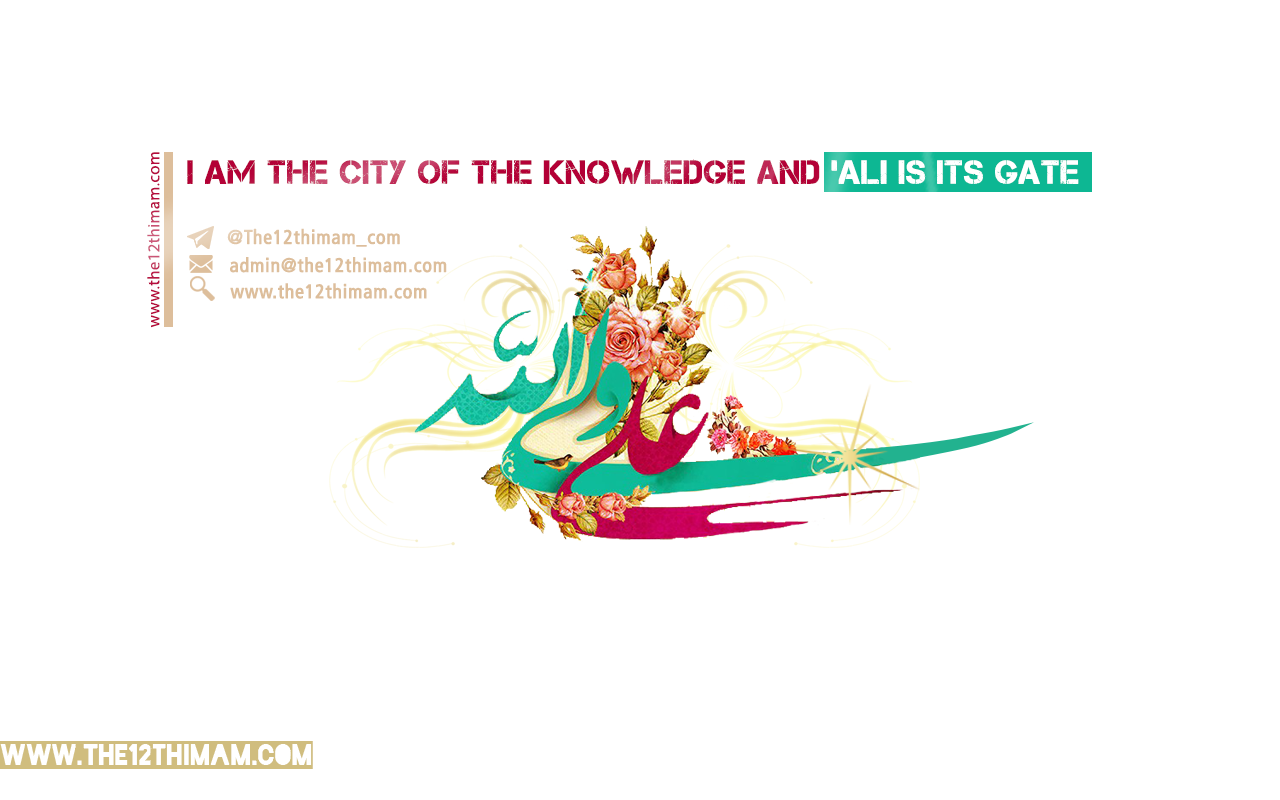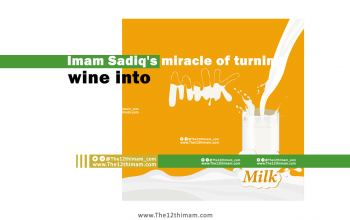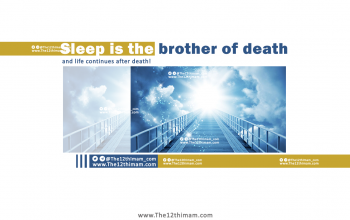Amir al Momenin Ali (a.s) was having a naturally purified nature. That is why he was blessed by the Creator of the universe with supreme knowledge and wisdom. In addition to that he was bestowed by the training of the Holy Prophet (S) from the day he was born. In fact we should consider Ali (a.s) a miracle of the Holy Prophet (S) with regard to knowledge, superiority, morals and
good qualities.
That in whichever field one looks; Ali (a.s) is found to excel in it. None of the Prophet’s companions got this superiority. It was due to the fact that the majority of them entered the company of Prophet after spending a better part of their life while Ali was with the Prophet every moment. They only got a chance now and then. On the other hand Ali (a.s) used to remain with the Prophet whether he was alone or in company. This was so because the
Prophet had said that he was the city of knowledge and Ali, its gate and also said that one who desires knowledge should enter from that gate.
Hadith of Madinat al-‘Ilm has been narrated in different ways such as the following:
| “ | أنا مدينة العلم و عليّ بابها فمن اراد العلم فليأت الباب I am the city of the knowledge and ‘Ali is its gate, thus whoever seeks the knowledge has to enter the gate.[1] | ” |
| “ | أنا مدينة العلم و عليّ بابها فمن اراد العلم فليأته من بابه I am the city of the knowledge and ‘Ali is its gate, thus whoever seeks the knowledge has to enter it from its gate.[2] | ” |
| “ | انا دار الحکمة و عليّ بابها I am the house of the wisdom and ‘Ali is its gate.[3] |
Hadith of the city of Knowledge is a hadith from the Prophet (s) about Imam Ali’s (a) virtue and eminence in knowledge over other companions of the prophet (s). It is among the proofs of Imam Ali’s (a) religious authority after the Prophet (s).
Salman Farsi relates that the Holy Prophet (S) said, “In my community Ali (a.s) is the most knowledgeable after me.”
A saying of Ibn Abbas is recorded in the book of Istiab according to which Ali is given nine out of ten parts of knowledge and others are made to share the remaining tenth portion. At another place it is mentioned that total knowledge was divided into five parts, four of which were given to Ali and the fifth was shared by all the people and this part also is shared by Ali (a.s) and in this Ali is having the larger portion.
Ibn Abbas reportedly said that his knowledge was obtained from the knowledge of Ali (a.s) and the knowledge of Ali (a.s) was derived from the knowledge of the Prophet and the knowledge of the Prophet was derived from the knowledge of Allah. Ibn Abbas adds that his knowledge and that of all the companions of the Holy Prophet (S) together is like a drop in relation to the seven seas. Dailami has related from Ibn Masood in Firdausul Akhbar that the Holy Prophet (S) said, “Wisdom is divided into ten parts, out of which nine are given to Ali (a.s) and the tenth is given to other people. Razi has written in Arbaeen that Ali (a.s) said, “The Messenger of Allah (S) taught me a thousand chapters (doors) of knowledge and each door opened upon me a million doors.”
Ahmad Ibn Hanbal quotes Musayyab that from the companions of the Holy Prophet (S) there was none who could challenge: Ask me whatever you want. None of the companions was having the knowledge of Quran like Ali (a.s). Tibrani has quoted Umme Salma in Awsat that the Holy Prophet (S) said, “Ali is with the Quran and the Quran is with Ali. And the two shall not separate till they come to me at the Pool of Kauthar.” Ahmad Ibn Hanbal has related from Umar that the Holy Prophet (S) used to say to Ali (a.s), “You have the most knowledge of Quranic verses among them.”
Ali (a.s) was a great scholar of Taurat, Injeel and Zabur. Imam Fakhruddin Razi has quoted the following saying of Ali (a.s) in his book, Arbaeen: If I am given rulership I will judge the people of Taurat by Taurat, the people of Injeel by Injeel, the people of Zabur by Zabur and the people of Quran by Quran so perfectly that each book would say: Ali has commanded regarding us, the same as is the command of Allah.” In the science of Quranic exegesis also none could equal Ali (a.s). Allamah Ibn Abde Barr has quoted Abdullah Ibn Abbas in his book, Al-Istiab that when we were proved something regarding the exegesis of Quran from Ali (a.s) there remained no need for us to ask anyone else. With regard to the knowledge of Quran also the status of Ali (a.s) is the highest. Most of the biographers are unanimous that Ali (a.s) had memorized the whole of Quran and recited it to the Holy Prophet (S) in his lifetime.
Ali was most knowledgeable in the science of traditions also, due to the fact that he had the most opportunity of the Prophet’s company. Thus it is mentioned in Sawaiqul Mohreqa that when he was asked why he was the one to relate the traditions of the Holy Prophet (S) the most, he replied, “When I asked something from the Holy Prophet (S) he informed me of it
and when I was silent he used to inform me himself.” In the same way Ali was most proficient of all in Islamic jurisprudence, legal code, scholastic theology, mysticism, astronomy, literature and eloquence, poetry, wit, science of the book, interpretation of dreams, knowledge of the ‘Jafr’ and ‘Jame’ (scrolls of knowledge) and mathematics etc. There are traditions with regard to all of the above in the book of Arjahul Matalib . Please note, who can be wiser than the one who has proficiency in all the sciences? And
how there be any error in his judgment or views. Error is possible when one is having deficient knowledge about a particular thing. There are many well-known thinkers and philosophers who presented theories regarding sciences and arts, against which people have raised thousands of objections.
Why is it that theories are modified or disproved everyday? The main reason is that they do not have the correct knowledge of the facts of the universe. They prop up theories based on conjecture and create a farce. On the other hand consider one who has authentic knowledge of the truths of divine recognition, who has received training from the Holy Prophet (S)? Can he ever commit a mistake in deriving conclusions? Also, his thoughts and judgments cannot move away from the correct center.
The fact is that the world has taken few benefits and guidance. After the Holy Prophet (S) there was such a powerful flood of materialism in the Islamic world that it completely turned away from religious instruction. And they dissociated from those who could have bestowed this treasure to them. In such circumstances, how could Ali have spread his sciences while for the ruling powers the aim of Islamic life was something else?
It is only to the credit of this divine thinker that even in such sorrowful period whenever he got an opportunity he provided guidance. His tenure of worldly rule was such that the enemies did not allow him to rule peacefully a single day. Even then he did not forget his duty in such severe times. The sermons he delivered everyday after the noon prayers were limitless treasures of sciences and arts.
He was always concerned for correcting the beliefs of the people and acting correctly on the religious commandments. He wanted to remove the defects in the knowledge and deeds of the people that had come into being during the tenure of the previous caliphs. It was a pity however that people were not ready to follow in the footsteps of Ali (a.s).
The wise sayings, wise thoughts and knowledgeable discussions of Ali (a.s) are still available. Which thinker has the audacity to refute them? No thinker, philosopher or reformer can dare to refute the views of Ali with regard to divine sciences, jurisprudence, secrets of nature and politics and administration, and replace them with his or her own theories.
The principles of governance keep changing everyday, but the system of Ali’s rulership is such that there is no scope of changes and alteration as it is something that can never change. When the world realizes the truth and ponders upon them, it would certainly try to accept him.
In any case our aim for the above discussion was to prove that Ali is the wisest one in Islam and he was having perfect wisdom, which is the foremost among the four greatest moral qualities.
In this field the step of Ali is neither found towards extremism nor towards conservatism, it is on that middle or the medium line, which is known as the straight path. If he had moved away from this line even a little bit, Ali would not have been what he actually was. When people saw the cunning and intrigue of Muawiyah they mentioned it to Ali (a.s) and he said,
“Muawiyah is not more cunning than I am but these things do not befit me.” Cunning is included among the low qualities and cannot be considered a virtue.
Reference:
[1] Al-Hakim al-Naysaburi, al-Mustadrak ‘ala l-sahihayn, Vol.3, P.126
[2] Ibn ‘Abd al-Barr, al-Isti’ab, Vol.3, P.1102
[3] Al-Tirmidhi, al-Jami’ al-sahih, Vol.5, P.637 (wiki
Akhlaq al-A’imma ,seyyid amrohi .p 13-14



